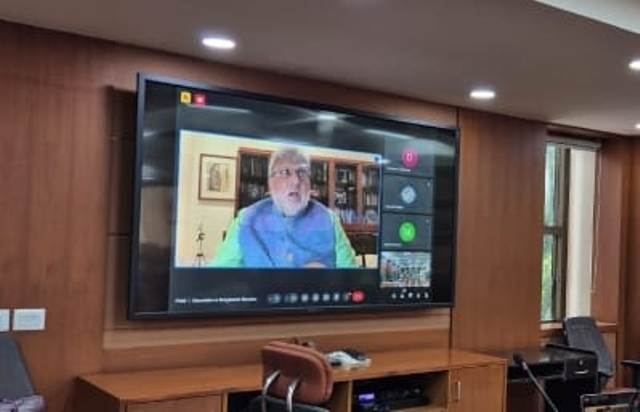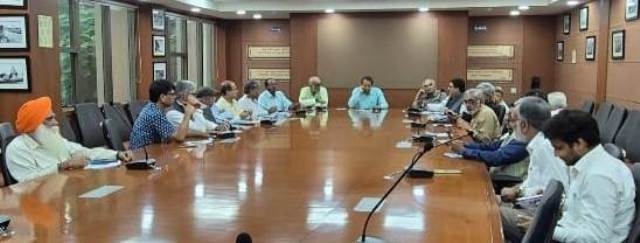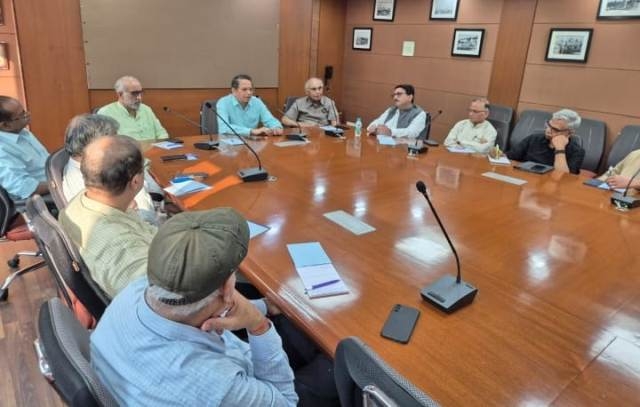Round Table Discussion on “Situation in Bangladesh”
25 Aug 2024 19:07:23
Round Table Discussion on “Situation in Bangladesh”
August 22, 2024
The political upheaval in Bangladesh has disturbed the situation of the South Asian region. The forced removal of former Prime Minister Sheikh Hasina and the appointment of Mohammed Yunus as Chief Advisor of the interim government have left Indians concerned about future of Bangladesh, and particularly of Hindus in that country.

To better understand and analyse the situation in Bangladesh, India Policy Foundation organised a roundtable discussion on 22 August 2024 in New Delhi. Dr. Vijay Chauthaiwale, In-charge, Department of Foreign Affairs, Bharatiya Janata Party (BJP) and Shri Shishir Bajoria, In-charge, Media Relations Department and State Executive, BJP, provided a detailed insight about the situation in Bangladesh. The discussion was chaired by Dr Mahesh Chandra Sharma, Chairman of the Research and Development Foundation for Integral Humanism. It brought together experts, academics, activists, and policy analysts to discuss the ongoing challenges of Bangladesh, including political instability, economic struggles, and social issues. The introductory remarks and subsequent discussion provided a comprehensive overview of the underlying factors contributing to the country's current situation and explored potential pathways for future.
Dr Kuldeep Ratnoo, Director, India Policy Foundation, who moderated the discussion, in his opening remarks said, “During the Bangladesh Liberation war, horrific atrocities were committed against lakhs of Hindu men and women. Despite this, India supported Bangladesh in its struggle for independence from Pakistan. Since then, Bangladesh has experienced numerous highs and lows, including periods of military rule and dictatorship. However, under Sheikh Hasina's extended leadership, relations between India and Bangladesh significantly improved. A key benefit was the containment of insurgency in India's northeast, along with a marked improvement in trade relations. As a result, Bangladesh benefitted on the economic front. Overall, India enjoyed a stable and positive relationship with Bangladesh. However, the sudden shift in events presents a significant challenge. Strangely, the overthrow of an elected government in a friendly nation and the subsequent attacks on minorities have not prompted a strong response from the Indian political parties, who claim to be secular and democratic.” He further set the tone for the discussion by emphasising that the path forward for Bangladesh would be examined through the lenses of diplomacy, politics, and social dynamics.
_202409021921524274_H@@IGHT_478_W@@IDTH_640.jpeg)
Dr Vijay Chauthaiwale, in his introductory remarks, provided deep insights about India’s relations with different political parties of Bangladesh and their leaders. He highlighted the fact that India always preferred a peaceful, stable and friendly neighbourhood, and Bangladesh was no exception. However, since creation of Bangladesh, political upheavals and military rules continued to trouble democracy in the country. Having seen both military rulers and Bangladesh Nationalist Party (BNP) led governments for several years, people in Bangladesh reposed their trust in Awami League leader Sheikh Hasina. India also maintained good relations with Sheikh Hasina government.
Commenting on the Bangladesh Nationalist Party (BNP), he said that India had maintained contact with the BNP leaders but relations soured after ties between the BNP and Jamaat-e-Islami were revealed. The BNP harbours a strong anti-India sentiment, which has prevented them from taking corrective actions that might improve relations. He added that before the announcement of elections, the BNP organised large-scale anti-India protests, reflecting their alignment with Jamaat which has connection to Pakistan's ISI.
Since BNP had boycotted the election, Hasina’s win was virtually guaranteed. “What led to the current situation is that she failed to become more inclusive or alter her governance style. Over time, she became increasingly inaccessible, even to her own party leaders,” he added.
Elaborating further, he said, Awami League leaders believed that close ties with India would boost their standing, but Hasina isolated herself, becoming close to other autocrats and losing touch with her political base. This isolation extended to her failure to plan for political succession, with her son living in America, her nephew involved in business, and her niece serving as a minister in the British Parliament—all settled abroad, leaving Hasina isolated.
Revealing lesser-known details of what has been happening in Bangladesh, Dr Chauthaiwale said, “Many believe that this situation is largely driven by American influence. The U.S. exerted pressure on the Awami League, insisting for a national government, signalling their disapproval of Hasina's leadership. When Hasina visited the U.S. for personal reasons, she was humiliated, with no significant American officials meeting her until a junior secretary did so out of courtesy on her last day in Washington, D.C. Hasina misjudged the extent to which she could rely on global powers, mistakenly believing that the Chinese threat would prompt them to protect her.”
He further added that the exact details of what transpired may only become clear in the coming years. Although Hasina has been ousted, the BNP has not been brought to power. Instead, the interim government led by Mohammed Yunus has been installed, and this transition could become permanent as there is little appetite for elections in Bangladesh. Hasina may never return to Bangladesh, and her son, lacking political acumen and understanding of the ground realities, is unlikely to fill her role.”

Addressing the concerns about the safety of minorities, mainly Hindus, in Bangladesh, he stated that the current unrest has already resulted in the documented deaths of 25 Hindus. However, he said that the Hindus in Bangladesh are not left alone as Hindu rights activists all the world have come out in support of the minorities in Bangladesh. He also stressed that in diplomacy, governments do a lot under the table. “If history is written after 20-25 years, then you will get to know what India’s contribution was in ensuring the safety of Hindus in Bangladesh,” he added.
Shri Shishir Bajoria in his remarks said, “A single spark set the entire nation of Bangladesh ablaze. After the Mukti Yuddh (Liberation War), Mujib introduced a quota reserving 30 percent of government positions for Mukti Yodhas (freedom fighters) and their families. By 2018, this quota had nearly faded out, though it wasn’t officially abolished. At the beginning of this year, a group of young people, descendants of Mukti Yodhas, approached the High Court, arguing they were being denied employment opportunities. The court ruled in their favour, but the government quickly appealed to the Supreme Court, clearly opposing the reservation. But inadvertently, Sheikh Hasina remarked that if Mukti Yodhas' families were denied reservations, would “Razakars”—viewed as Islamic fundamentalists—receive them instead? This triggered a nationwide slogan, "Who are you? Who are we? Razakar, Razakar," sparking widespread unrest.
Outlining the history of India-Bangladesh relations, Shri Bajoria stressed that there is no doubt that Bangladesh’s victory in the Mukti Yuddh was impossible without India’s support, but Bangladesh has never fully acknowledged India’s contribution, referring to the Indian forces only as a "friendly military" or "mitra sena" in a few instances. The historic photograph of Lieutenant General Jagjit Singh Aurora of the Indian Army and Lieutenant General A. A. K. Niazi of the Pakistan Army signing of the Instrument of Surrender is notably absent from public view in Bangladesh.

Fast forward to 2024, and the political landscape is tense. Khaleeda Zia’s son has been living in London for 15 years, while the Awami League, with a full majority, has cultivated strong ties with China, while proclaiming a bond with India rooted in blood. However, the establishment of a Chinese naval base in Bangladesh became a point of contention, unacceptable to the U.S. Amidst these geopolitical tensions, internal issues were brewing beneath the surface, largely unnoticed.
He added, “When protests against the reservation policy erupted, security forces responded with lethal force, killing nearly 250 people. While it seemed that the unrest had been quelled, the underlying tensions continued to agitate people. The full extent of the situation remained unpredictable.”
“On August 4, Sheikh Hasina faced a life-threatening moment. She never anticipated having to flee, but the situation escalated rapidly. If the army hadn’t delayed the advancing crowd by 15 minutes, she might have been killed. Hasina wished to address the nation, but the army insisted she leave immediately. There is now a possibility that the Bangladesh government may request her extradition.”
He also pointed out the fault lines in Bangladesh. He said, “The Hindu community in Bangladesh, as always, looks to India for support during crises, as they receive little backing within their own country. Jamaat-e-Islami, deeply entwined with the ISI and a key component of the BNP, had been a significant force. To counter this, Sheikh Hasina created Hefazat-e-Islam, appointing one of its members, Muhammad Hasan Mahmud, as the country’s foreign minister. Strangely, Hefazat-e-Islam is now part of Mohammed Yunus’s interim government.” He also pointed out that all is not well in Bangladesh, noting that while the Awami League claims to be a secular party, the reality is complicated by the fact that Islam, as practiced in the country, does not easily accommodate this stance.
Commenting on the current situation, Shri Bajoria said, “Yunus’s visit to Dhakeshwari Mandir has had a positive impact, but questions remain about how much real power he holds. Just two days after assuming office, he was forced to comply with student protesters' demands to remove certain judges from the Supreme Court and to change the home minister. Yunus has declared that the government will not change until reforms are implemented, setting an agenda for the next two to three years.”
Addressing the geopolitical concerns, he said that India cannot alter its neighbours, and with 80 percent of Bangladesh bordering India, the implications are significant. For West Bengal in particular, a major refugee crisis looms, with the potential for anti-national elements to infiltrate, posing a direct challenge to India’s security and stability.
In the ensuing discussion, responding to participants’ queries, Dr. Chauthaiwale highlighted the differing concerns of India and Western countries regarding Bangladesh. He pointed out that while India's primary concern is terrorism, America's focus is on countering China's influence. This disparity in priorities explains why Mohammed Yunus, who has spent much of his productive life outside Bangladesh, was placed in power by the Western interests. He added that the U.S. does not share a physical boundary with Bangladesh and so, it is not directly focused on curbing terrorism in the region, allowing it to pursue its interests more freely. In contrast, India, which has a direct geographical connection and significant security concerns related to terrorism, does not have the same level of flexibility in its actions. Shri Bajoria further mentioned that China has established a naval base in Bangladesh, which poses a strategic threat not only to U.S. but also to India as well.

He also emphasised the significance of trade in India-Bangladesh relations, noting that 70 percent of Bangladesh's economy relies on textile exports, much of which involves trade with India and Pakistan. This economic dependency gives India some leverage to exert pressure on the Bangladeshi government, as Yunus is keen on maintaining strong ties with India to support this crucial sector. Commenting on a question about how the situation in Bangladesh has impacted the people of West Bengal, he noted that the connection between Bangladesh and West Bengal is not as close as it might appear. Despite some cultural and linguistic similarities, there are significant differences in language, food, and other aspects of daily life that set the two regions apart.
Answering a question on whether there is a larger power game going on in South Asia, Dr Chauthaiwale remarked that Pakistan, Sri Lanka, and Bangladesh all had rulers who were openly opposed to the U.S., suggesting that this pattern is not coincidental but indicative of a broader power game. He acknowledged that while there is corroborative evidence to support this view, it remains speculative.
In his concluding remarks, Dr Ratnoo highlighted a critical issue: despite Bangladesh’s per capita income once claimed to be higher than that of India, the country is now facing widespread concerns about high unemployment rates. This discrepancy raises questions about whether a specific narrative was promoted regarding Bangladesh’s economic progress, or the agitating people were driven more by radical communal agenda than their economic hardships.